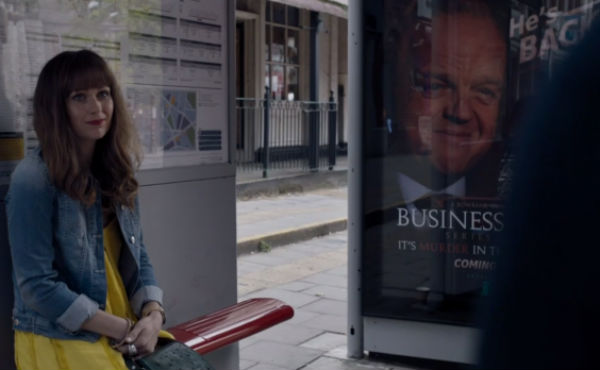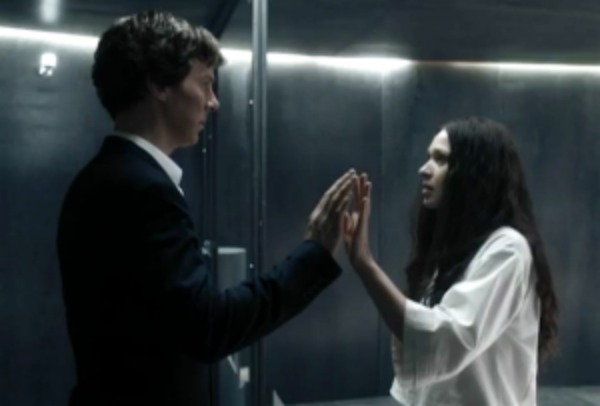Femme Friday: Eurus Holmes

“There’s an east wind coming.”
Eurus Holmes is as polarizing a character as the BBC’s Sherlock has ever produced. Alongside Moriarty, she’s the unseen architect of several events throughout Sherlock’s life and the series. Many fans suspected a third Holmes sibling throughout the first three seasons of Sherlock, but few suspected anything like the person Eurus turned out to be.
She’s “the other one,” the East Wind, and she provides one of the clearest windows into Sherlock’s heart and motivations that the series has ever presented. Not always beloved, but always interesting, she’s worth exploring.

Meeting Eurus
Eurus Holmes is foreshadowed throughout Sherlock by the impressionistic intrusions of Redbeard and in Mycroft’s veiled references to another Holmes sibling, but she bursts fully onto the scene in season four’s “The Six Thatchers,” when she flirts with John on public transportation. Subsequently, she takes on the role of his therapist and of Sherlock’s client, a three-disguise hat trick reminiscent of femme fatales in film noir.
In “The Finale Problem,” Eurus reveals her true self, the institutionalized younger sister of Sherlock and Mycroft, whose apparent insanity led her to commit such unspeakable acts as a child, including the murder of Sherlock’s childhood friend Victor Trevor, that she was permanently sent away from the family.
Through games reminiscent of the Saw franchise, and with a mesmeric persona that echoes Sir Anthony Hopkins’s Hannibal Lecter in The Silence of the Lambs, Eurus unfolds as a larger-than-life antagonist. She knows how to push her brothers to the breaking point, and she uses her knowledge, combined with posthumous help from Moriarty, to break them down piece by piece.
At the same time, the show gives a window into Eurus’s own psyche, though viewers don’t know what they’re seeing at first. Part of of the episode takes place in an airplane that appears to be plummeting toward destruction, with a single child on board to halt the disaster. In the episode’s final moments, that child is shown to be Eurus herself, with the plane her own torturous psychological prison.
In season four’s last shots of Eurus, she’s once again contained, but she’s not alone. Sherlock, who throughout the run of the series has overcome his own feelings of alienation, passes on the grace extended to him by Watson (and to a lesser extent by others) and reaches out to his troubled sister with music, a gift they both share.

Meaning of the Role
Losing the through-line of what Eurus means to the story of Sherlock is unfortunately easy because of the many tropes that surround her and visual and textual references to other media that she embodies. Nevertheless, she functions in a very specific way in the story, one that bears investigating: She’s a parallel to Sherlock himself.
One of the more jarring aspects of the show for many fans has been the casual use of mental health terms like “psychopath.” Much like Doyle’s canonical Holmes is said to be cold but obviously isn’t, Sherlock’s titular character is shown, over and over, to be far from the “high-functioning sociopath” he claims to be. Finally, when Eurus appears, the origin of his strangely myopic self-view is revealed. At the beginning of the series, Sherlock believes he is incapable of human connection and friendship; it is Eurus, however, for whom this actually appears to be true. She psychologically poisons those she interacts with, the way Sherlock, before his friendship with Watson, seemed to believe he did, as if his little sister’s issues had seeped into his subconscious at a young age and seemingly altered his self-view irrevocably.
The friendship of John through four series teaches Sherlock, not to be human—he was already fully that—but to embrace his entire self, to realize that he’s capable of connection with other people on a level he obviously thought was impossible for him. In the end, he chooses to extend that same hope to Eurus, having come full circle to believing that no one is beyond hope.
The writers leave Eurus herself as an enigma. Viewers may never know if Sherlock’s embrace of his younger sister and subsequent visits to her actually get through to her troubled mind. The point is that Sherlock has come to believe that it’s worth it to try. His question in “The Great Game”: “Will caring about them help save them?” gets a resounding affirmative answer. The man who once thought caring was a disadvantage finally knows that it was Watson’s care that saved him, and now caring about Eurus is what enables him to attempt to save her.
In the end, it is Sherlock’s character development that matters to the series, far more than Eurus’s. Therein lies a potential problem. In a show where extremely intelligent women are most often portrayed as antagonists or criminal masterminds, Eurus is another clever, disturbed woman joining the ranks for the purpose of providing insight into Sherlock. In a show called Sherlock, it’s reasonable that most other characters are secondary to him in terms of story and screentime, but when multiple female characters are reduced to existing solely to explain and bounce off him, questions arise about agency and sexism, as well as the use of characters as plot devices.
Nevertheless, the final violin duet between Sherlock and Eurus is captivating, and Sian Brooke’s powerful portrayal of Eurus refuses to let her fade into the shadows of any of the show’s male characters. She’s simply too strong of a presence.

Eurus and the Holmes Canon
Eurus has a stronger connection to the Doyle Canon than may be immediately apparent. In Doyle’s “His Last Bow,” Holmes famously says, “There’s an east wind coming, Watson,” meaning the First World War. The story was written as British war effort propaganda, and Holmes goes on to say, “a cleaner, better, stronger land will lie in the sunshine when the storm has cleared.”
Eurus, who shares her name with the ancient Greek personification of the East Wind, also starts out as a destructive force, literally obliterating 221b and forcing her brothers and Watson into a deadly trap. In the end, however, she serves as a scalpel that cuts away Sherlock’s remaining wounds and reveals him as the full-fledged man and detective he was always meant to be.
Like Doyle’s east wind of war, the surgery she performs is painful and ugly, as she uses manipulation and terror to strip away at the layers of her siblings. Without realizing it, though, she does what no one else could—she holds up a mirror to Sherlock Holmes and shows him who he really is, with all of his defenses gone, and he finally sees the reflection of a self he can accept, a person who is stronger and better than he ever thought he could be.
In hindsight, it’s difficult to feel fully at peace with the idea of the canonical Holmes’s ready espousal of one of history’s deadliest wars. Similarly, it’s psychologically challenging to accept the idea that Eurus’s sadistic antagonism ends up serving a positive purpose. No doubt, readers will continue to debate the concepts of “His Last Bow” for years to come, and in a similar way, viewers of Sherlock will continue to debate and wrestle with the compelling, difficult character of Eurus Holmes.

Amy Thomas is a book reviewer, freelance essayist, and author of The Detective and The Woman mystery novel series featuring Sherlock Holmes and Irene Adler, published by MX Publishing. She holds a degree in professional communication and is an avid knitter, geek, and grammar nerd. Amy blogs about Sherlock Holmes at Girlmeetssherlock.wordpress.com and can be reached for professional enquiries at nottinghillnapoleon@gmail.com. Connect with her on Twitter @Pickwick12.
Once again, you have convinced me to look at Eurus in another perspective and actually made me start to like her.
An excellent thoughtful and insightful essay! Thank you. Amy.
Absolutely incredible! I loved every single word of this and will most likely refer to it later. Eurus is such an ambiguous character and you gave her even more depth. Great work!
Great analysis. …nice to see a thoughtful review after the emotional reaction to Series 4.
A rousing YES! There’s so much richness to be found in analyzing Eurus and her role in the series. And, in a way, it’s such a relief to see dear Sherlock in a context in which *he* is not *his genius* at all, and there still remains a vivid, complex, lovable human, apart from his mental gifts.
“as if his little sister’s issues had seeped into his subconscious at a young age and seemingly altered his self-view irrevocably.”
Yes! Thank you, Amy.
Hello this is kinda of off topic but I was wondering if blogs use WYSIWYG editors or if you have to manually code with HTML. I’m starting a blog soon but have no coding skills so I wanted to get advice from someone with experience. Any help would be greatly appreciated!